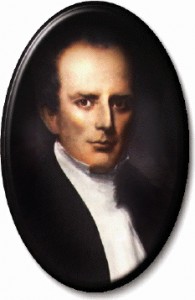
The Exchanged Life
The Exchanged Life is the one-sided trade of my sins, inadequacies, and numerous failings for Christ’s forgiveness, life-sufficiency, and overcoming victory. Ultimately, the greatest of all exchanges is Jesus Christ, the one who is fully man and fully God, truly innocent and without sin, taking upon himself at Golgotha all my selfishness, rebellion, sin and hatred and substituting his righteousness, forgiveness, restoration and love. I can live the Exchanged Life because Christ by his gracious grace made the Great Exchange of my sin for his righteousness on the Cross.
At the foundation of the Christian life lies vicarious atonement, which in essence is a transfer of guilt from the sinner to the Saviour. I well know how vigorously this idea is attacked by non-Christians, but I also know that the wise of this world in their pride often miss the treasures which the simple-hearted find on their knees; and I also remember the words of the apostle: “For God made Christ, who never sinned, to be the offering for our sin, so that we could be made right with God through Christ†(2 Cor 5:21, NLT).
This is too plain to miss for anyone who is not willfully blind: Christ by His death on the cross made it possible for the sinner to exchange his sin for Christ’s righteousness. It’s that simple. No one is compelled to accept it, but at least that is what it means.
A. W. Tozer, That Incredible Christian (Harrisburg, Penn: Christian Publications, 1964), 32.
The Exchanged Life is practical day-by-day trusting in an all-sufficient Christ who lives within me by an all-powerful Holy Spirit. This same Holy Spirit enables me to live the life of Christ in a world gone mad. Christ’s life is my life when I receive his life by faith. As Christ lives his life in and through my life, my life becomes an abundant life. As a result, my Christian life becomes a life of spontaneous joy. Joy is that deep, supernatural fulfillment that comes in knowing that I am experiencing and expressing the one who is true satisfaction, Jesus Christ. Joy is knowing that I am unconditionally loved, graciously forgiven, and eternally kept. Joy is released in my life when I cultivate Christ’s conscious, constant presence. The Exchanged Life is the direct daily application of the Great Exchange—a continual substitution of my weaknesses, shortcomings, and failures for Christ’s strength, adequacy, and victory. The Exchanged Life is Christ changing me:
You can never have a changed life until you experience the exchanged life. Christians are continually trying to change their lives; but God calls us to experience the exchanged life.
Bob George, Classic Christianity: Life’s Too Short to Miss the Real Thing (Eugene, OR: Harvest House, 1989), 108.
The exchanged life is passive in that Christ works in me, but it is active for Christ empowers me to make righteous right choices. I must choose to walk in the Spirit, put on the new man, and trust my heavenly Father’s guidance and direction. As I maintain the confidant expectation that God will be faithful to his promises, then I can anticipate and expect his gracious exchange of my weaknesses for his strength.
But those who wait (or hope) on the Lord shall renew (Hebrew: exchange) their strength; they shall mount up with wings like eagles, they shall run and not be weary, they shall walk and not faint. (Isa. 40:31, NKJV).
The Great Exchange of the innocent, sinless Christ who takes my judgment upon himself is the greatest act of love and grace in the history of humankind. Below is a list of the wonderful benefits of God’s most gracious act—the death of Christ upon the Cross.
The Benefits of the Cross
He was born to die, so I could be born to new life.
He suffered temptation, so I can experience victory.
He was betrayed, so I might know his faithfulness.
He was arrested and bound, so I could be rescued from bondage.
He stood trial alone, so I might have an advocate.
He was wounded, so I could be healed.
He endured mockery, so I could know dignity and joy.
He was condemned, so the truth could set me free.
He was crowned with thorns, so I might crown him with praise.
He was nailed to the Cross, so I might escape judgment.
He was stretched out between thieves, so I could know the reach of his love.
He suffered thirst, so I can drink living water.
He said, “It is finished,†so I could walk by faith.
He was God’s Lamb, Slain, so I could claim His sacrifice as my own.
He was forsaken by the Father, so I would never be rejected.
He chose the shame of weakness, so I can know the hope of glory.
He shed his blood, so I can be white as snow.
Michael Card, A Violent Grace (Sisters, Ore: Multnomah Publishers, 2000).
When I believe and receive the benefits of the Cross, my act of faith is most pleasing to God. For I take the Lord at his word, I recognize that the Cross is the great expression of his unconditional love. I will bring joy to God’s heart if I allow him to live his life in and through me. Christ in me, Christ through me, Christ upon me and Christ ever before me that is the Exchanged Life. “This is how God showed his love among us: He sent his one and only Son into the world that we might live through him†(1 John 4:9, NIV).
It is a marvelous thing to know that Jesus Christ is the Son of God, but a more marvelous thing to know that He is the Son of God in me.
Oswald Chambers, The Complete Works of Oswald Chambers (Grand Rapids, Mich: Discovery House Publishers), 482.
Let us pray:
Grant, O Lord, that in your wounds I may find my safety, in your stripes my cure, in your pain my peace, in your cross my victory, in your resurrection my triumph, and a crown of righteousness in the glories of your eternal kingdom.
Jeremy Taylor quoted in The Westminster Collection of Christian Prayers



